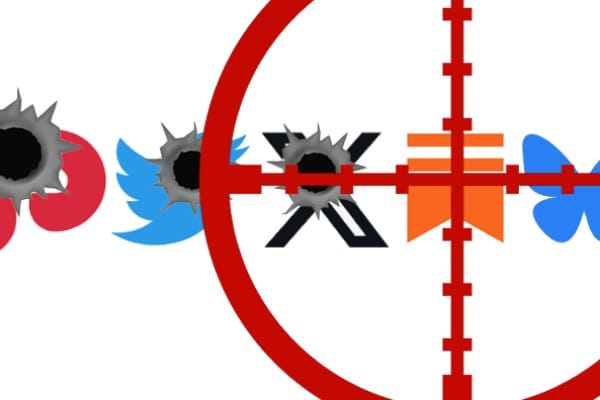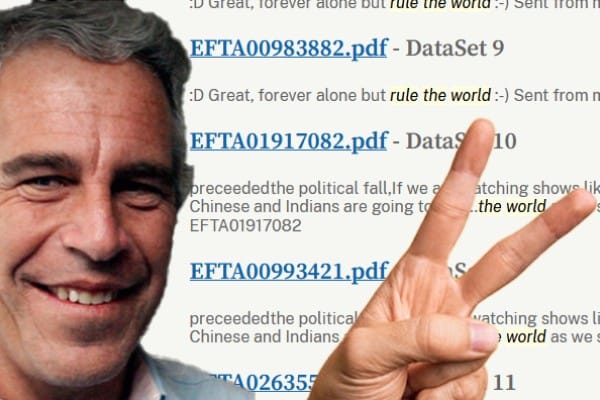The Hard Problem of Social Media: Run Rabbit Run

Well hello again, December.
This is the one year anniversary of the most popular thing I’ve ever written on the Substack platform and it was about how that platform is going to be in trouble if it didn’t figure out what it wanted to be:

Now we’re back, sleighbells are ringing, and it’s time to play my favourite Christmas game, which I call Let’s Find Out What S Peter Davis Was Right About This Year.
I have no reason to believe any of the staff at Substack read my piece last December, nor have they ever shown particular interest in taking advice from the community. And that’s fine, who the hell am I? Not someone with any particular expertise, nor a huge following. I’m no Alex Dobrenko, that’s for sure.
Nonetheless, 2024 has been a very big year for social media, but one thing that has not changed is that Substack still can’t figure out what it wants to be. It’s a social media platform that doesn’t know anything about social media platforms and they don’t care to learn because they deny being a social media platform even though its primary selling point is its network effect.
Thing is, simply saying that you’re not a social network doesn’t magically absolve you of the need to do any of the work involved with that, and just dropping in every once in a while to sarcastically bitch about people asking you very valid questions doesn’t count.

My main thesis was this: One, a key goal for social media companies, their Holy Grail of sorts, is to figure out how to emulsify a wide range of social and political beliefs, some aggressively opposed to each other, into the same community without it breaking apart. Nobody has figured out how to do this very well yet.
Two, you cannot force people to use a social media platform, and certain types of content (such as pornography or bigotry) tend to take over a platform if it is unrestricted because it pushes out people who don’t want to be around it. I call this liquid content because it fills the shape of its container.

Platforms usually attempt the laziest possible strategy of fostering an emulsified community by simply citing “free speech” and largely just letting anyone say what they want within the law, but because you can’t force people to participate, this degrades into a monoculture over time. Platforms that don’t moderate pornography eventually become porn websites, platforms that don’t moderate white supremacy eventually become white supremacy websites, etc.
Twitter—that is, back when that’s what it was called—did a decent but imperfect job of maintaining a community in which the very broad center was able to exist in uneasy ceasefire.
Pre-2022 Twitter was maybe the closest thing to the so-called “town square” concept that anyone had achieved to date. It was a very center-liberal website. They had that Overton window wedged open as far as anyone has ever managed.
The problem for Elon Musk was that it nonetheless didn’t allow straight up white supremacists, so it still wasn’t providing the full breadth of speech that he was interested in seeing. So he fired the content moderators, shuttered the trust and safety department, and removed the “no Nazis” rule. You know, just to let them have a seat at the table like everyone else. Fair’s fair.


Just two years later, Twitter is now a white supremacist website. It’s a rapidly failing business that might limp along a while longer with federal support given Elon Musk’s new government position in the second Trump administration, but it’s basically doomed.
(Note: One thing I didn’t predict last year and would never have predicted in my worst nightmares was that I would ever type the phrase “Elon Musk’s new government position in the second Trump administration.” But life is full of horrors rarely imagined.)

Still, no matter how many lawsuits Musk files against fleeing advertisers, corporate competitors, and journalists who dare write critically about him, and no matter that he will now have the full weight of the American government working on his side for the presumably brief time that Donald Trump will tolerate his insubordinate attitude, Elon Musk cannot possibly force people to use Twitter. That mere fact is larger than him, and it’s the first time in his entire life that anyone has ever told him “no,” and he’s not handling it well.
If there’s one thing that Matt Taibbi et al’s Twitter Files actually revealed, it’s not that there’s an insidious big tech/deep state/reptilian conspiracy against conservatives on social media, but in fact just how hard Twitter’s trust and safety team worked in the monumental effort to maintain Twitter’s stability and viability.
Last year I used the analogy of a sauce emulsion breaking to describe what happens when a “free speech” internet community can’t hold itself together, and sometimes perhaps the only thing that does hold it together is the lack of a viable alternative. But the social media sauce that held together decently as Twitter has well and truly broken, now. The lines aren’t perfectly drawn, but there are three fairly distinct factions:
The Right: Broadly across the spectrum, from “post-left” types like Matt Taibbi, to reactionaries, to conservatives, to MAGAs, alt-rights, groypers, and Nazis, are sticking around on X the Everything App. It’s a real hoot over there.
The types of people you think of as “normie” liberals who fled Musk’s app to avoid any amount of politics at all wound up largely on Threads, the variant run by Facebook/Instagram. It’s this platform that has scooped up the influencer-obsessed mainstream culture that Meta has always catered to best. It’s celebrities, pop culture, and brands.
But then of course there’s the most interesting faction (to me)—Bluesky, which has captured the politically conscious liberals, the progressives, and the leftists (the right thinks these are three words for the same group, but trust me, they are three distinct things that do not necessarily get along).
The American election was, for a huge number of liberals and leftists, an absolute fork in the road for their relationship with what was still Twitter in their hearts. If Kamala Harris won, then there was a possibility Elon Musk might step back from his social engineering project, or maybe his creditors might try to claw back their investment and push him out. That direction was a complete mystery lined with glittery hope. The certainty, though, was that if Trump won, then Musk and, by extension, X would merge with his administration and become a tentacle of Trump’s media empire, lost forever.
The very moment that final hope was decapitated, starting the very night of the election, Bluesky picked up a whiplash-inducing influx of new accounts, while at the same time, Musk’s platform experienced a record breaking number of account deletions and lockdowns. As I predicted last year, the combination of a tipping point and a viable alternative was like someone dropping a tablespoon of lemon juice into the cheese sauce.

Now, let’s examine: Twitter (and I’ll continue calling it that because my hands literally stage a coup against my wrists when I try to type that idiotic other thing) and Bluesky are both billed as free speech platforms. So why don’t they look the same?
I’ll put aside Threads for this discussion because it is not, nor does it pretend to be, free speech. It is an aggressively curated brand-friendly thing that I’m fine with existing as an alternative for people who just want to talk about pop science and read cute webcomics. Christ, I envy their sanity.
But Twitter is undoubtedly now a right-wing echo chamber, and Bluesky has been accused of being a left-wing echo chamber. Both sides tend to think that they are free but the other side is being engineered through heavy manipulation and censorship. To an extent, they’re both wrong.
Elon Musk’s Twitter is a less heavily engineered to the right than people tend to assume. Provided you follow the accounts that you want to follow and don’t seek people out to argue with or dunk on and, ideally, avoid the algorithmic feed, then you don’t get the avalanche of reactionaries and Trumpists that you’ve been led to expect. Although Musk did recently weaken the block function, you can still block people from interacting with you if you want.
Don’t get me wrong, I’ve typed a shit ton of words about Musk’s project to use Twitter to drag the window of discourse toward the far right, so I’m in no way denying he’s doing it, but in so far as some non-lunatics still do exist on the platform, it’s still possible to curate the feed.
I say possible and not easy because this requires a lot of work due to the difference in attitude between the right and the left on social media. Right wing politics is liquid content because it has an imperial attitude, it wants to seek out and grind down and smother and achieve victory over people. You know it from their derision toward “safe spaces” that they cannot tolerate there existing any space on Earth in which their voices aren’t present and dominant.
Listen to the right’s champion podcaster Joe Rogan talking to the egg-themed Batman villain Mark Andreesen about how he doesn’t even understand not wanting to spend every second of his time online confronting and challenging and arguing with people he disagrees with. People who don’t want to spend every moment of their lives attacking someone else’s opinion are, to his mind, just incomprehensible aliens, to the extent that it’s morally wrong to allow people a space away from needing to do that even temporarily.
Rogan and Andreesen don’t get that most people find the thought of that exhausting. We’re not all machines designed to engage in perpetual stress and argument, not is it our responsibility to do that. Seeking out low stress alternatives for social interaction isn’t weak or somehow a sign of cowardice. In fact, it’s only very recently in human history that we’ve established an expectation of everyone that we’ll all spend our off hours having heated, insult-laden, sarcastic, obnoxious arguments with strangers about bullshit.
You don’t need Andreesen to say it but it does help confirm that Musk’s Twitter hasn’t just failed to avoid this toxic ecosystem of perpetual misery but has taken steps to deliberately engineer it, because right-wing psychopath tech oligarchs think this is Good For Society.

It’s important to understand that Twitter’s mission is different from, say, Truth Social’s mission. Truth Social is explicitly a right-wing community for right-wing politics, and it doesn’t pretend to offer anything there that liberals would want. Elon Musk, on the other hand, doesn’t want to drive people off Twitter—he wants to convert them. It’s an indoctrination chamber.
This is a distinction without much of a difference, though, because the end result is much the same. No matter what the owners want people to do, the people are going to do what they want to do. Try as they might, the tech oligarchs can’t prevent the free movement of people on the internet. Not yet, anyway.
If a social media app or website wants to retain users then it simply has to work to maintain the type of ecosystem that your users want to spend time using. And nuddy, you can cry all you like, you can sue whoever you want, you can complain and scream “But that requires censorship!” That’s great, pal, stand by that principle and enjoy your bankruptcy.
Elon Musk, of course, doesn’t know how to make a product that people want to use, which is why his only tactic is to try to either bully people into using it or else destroy all the competition by either drowning it in threats, frivolous lawsuits, or simply buying it. We now know, for example, that the reason Musk became so suddenly furious with Substack midway through last year was because he tried to purchase it and was refused. (Previously I blamed Matt Taibbi for this entirely, and this is the only thing I’ll apologise to him for).
So since the most recent exodus from Twitter to Bluesky, the media, or at least hose in the media who are beholden to ensuring Musk’s project is successful, has been awash with hit pieces about Bluesky as an insidious left-wing circlejerk. An echo chamber, oh no! One of these evil safe spaces!

But here’s the thing about Bluesky: Also against the common misconception of Twitter users, Bluesky is not heavily moderated from the top down. There is no primary algorithm (users can create their own) and there is nothing technically preventing the right from creating their own ecosystem on Bluesky. Nobody is banning anyone for overt Trumpism, or for any political speech.
Unlike Twitter, there is no conspiracy to engineer the userbase in a particular political direction. What Bluesky has simply excelled at is creating a product with extremely powerful platform moderation tools for curating your own experience. This means that there is no top-down effort to manufacture a left-leaning community, but a left-leaning community emerges organically through the inability of the right to brute-force their way into people’s lives.
A block on Bluesky is a fucking block. It’s not a “strong mute” or however Musk characterises his feather-weak moderation system on Twitter. There is no master algorithm that tries to force people to see and engage with “counter-arguments to their worldview.” In fact, you can choose your own damn algorithm, how’s that for an idea? The approach Bluesky is taking to empower users to make their own choices is proving, in and of itself, to generate resilience against an encroachment of liquid fringe content. The far right are also perfectly free to create their own community on Bluesky but, if they’re unable to squash the left-leaning communities, then it would be utterly redundant to do so. They can just stay on Twitter. Most of them have chosen to.
It turns out that, if you give people the ability to throw a switch that removes “misery” from their social media experience … they will throw the switch.
If this is starting to sound like an advertisement for Bluesky then that’s probably because I’m becoming really bullish on Bluesky. There are some very valid counterarguments to my optimism, including from the brilliant Cory Doctorow, whose dubiety should give anyone pause. To give counterbalance to myself I would recommend you read his article as well as Dave Troy’s article.
For now, though, let’s get right down to it, shall we? Let’s finish up where I started last month with another episode of S Peter Davis Shits Where He Eats.

So what’s going on with Substack?
What drove me to pen The Hard Problem of Social Media last year was the controversy that followed the media scandal of the number of white supremacy newsletters hosted by Substack and the subsequent announcement by its owners that Substack wouldn’t be removing these publications or even stop taking a cut of their profits, citing freedom of speech values. I am not here, as I did not back then, adding another essay to the pile of moral indignity about that disaster. But once again I must talk about the business direction of Substack itself.
Substack, which again tries to avoid presenting itself as social media, makes a big deal out of its network effect in generating exposure for writers (that is: its internal social media system). Chiefly, this involves Substack Notes, its Twitter clone that connects all author and reader accounts onto the same algorithmic pseudo-Twitter feed.
Like Twitter, Substack’s very strong focus is on algorithmic discovery. I don’t believe this is as malicious in Substack’s case as it is in Twitter’s—whereas Elon Musk wants you to “discover” shitbag racist opinions from the worst people in the world, Substack simply wants you to discover people to subscribe to, preferably with money. Intentions notwithstanding, the result is the same—a social feed, addictive in the first place, with extremely limited user control over an algorithm that is largely unconcerned by the amount of shitbag bigotry and fringe right liquid content it contains.
After Substack’s Nazigate scandal of this time last year, Notes became damn near an unusable social feed for all the sneering assholery that got stirred up as victory-lapping reactionaries sought to rub it in the face of every left-leaning writer that this site belongs to them. The question I posed to Substack is whether, from simply a business perspective if not a principled perspective, they were really prepared to accept the associated exodus of people who wouldn’t put up with that bullshit, submit to the liquid takeover of the far right, and try to maintain operations as a kind of Rumble for writers.
I’ve made an uneasy peace with Substack over the past twelve months but, I have to say, after this presidential election, all that toxicity has come flooding right back in. Once again I have to pull back from using the very features that make the platform useful for myself as a writer—and which make me useful to the platform.
Substack still hasn’t pinned down what kind of platform it wants to be, and I fear it’s being harmed by its own purgatory.
Nothing gets Substack co-founder Hamish McKenzie fired up like the accusation that Substack is a “walled garden,” a metaphor for social media platforms that deliberately make it difficult to leave them. It describes a broad range of techniques, from keeping all of the personal data that you associate with a platform locked to that platform, to other tricks like simply disallowing or throttling links to outside websites (to keep you from clicking away from the feed and looking at something else).
This very week, news stories emerged that accentuated Twitter’s guilt on both of these fronts: Arising from the hilarious affair of Alex Jones being forced to sell his entire business empire to The Onion satire franchise, Musk’s lawyers filed an objection to block InfoWars’ various Twitter accounts from being included in the sale because Twitter claims sole ownership of all of Jones’ data associated with the site.
At the same time major news stories broke about a slip-of-the-wrist admission that Musk made that Twitter throttles outside links. And, okay, media guys? I actually knew about this eight years ago back when it started happening, it’s one of the biggest reasons Cracked folded, but that’s okay. You didn’t ask me. But that’s okay. Enjoy your big 2024 scoop that social media companies throttle links.
Substack has no such limitations. I can download a spreadsheet of every email address that subscribes to me! I can download all of my own articles and upload them wherever I want!

That’s one perspective, but here’s another:
As a writer with a Substack publication, how do I advertise my work? We have already established that neither Twitter not any of the platforms under the Meta umbrella will allow me to link to this article on their apps. I was writing an article a week on this thing for nearly a year before I ultimately gave up trying to promote it on any of those platforms. They are, you see, walled gardens.
The only hope is to promote myself on a platform that doesn’t squash outside links—enter Bluesky! The last bastion of true social media freedom!
But see, here’s the thing—if you ever try to promote a Substack newsletter on Bluesky, no matter how clean you come across for left-Twitter’s diaspora, you get a lot of frowns and a lot of awkward silence. Because Substack, for its free speech principles, famously won’t disavow its Nazis.
For promotional purposes, that leaves me with … Substack’s internal social network. Which is really great! In the couple of years I’ve been writing this thing, I’ve gained over a thousand subscribers from Substack’s internal social network. The only place where I can easily market this publication. Which I would lose access to if I left the platform.
That’s a walled garden, guys.
It’s also a walled garden that currently can’t figure out how to turn a profit, which is bad news because it’s running on tens of millions of dollars of venture capital. And the thing about venture capital is that those guys are going to want their investment back tenfold. As an aside, you’ll never believe who the primary guy is funding Substack.

Can you really afford to drive people away? Sooner or later this guy is going to come knocking. Egghead sends his regards.





